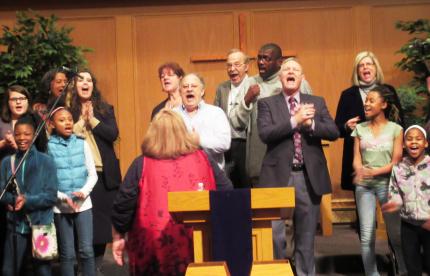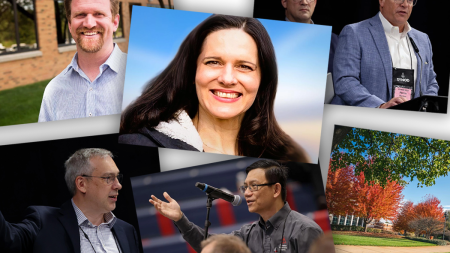Speaker Talks of Redemptive Suffering

The combined choir sings at this week’s Martin Luther King, Jr. Day service.
A Martin Luther King, Jr. Day service, cosponsored by the CRC’s Office of Race Relations, brought together nearly 200 people on a snowy night this week.
Held at Millbrook CRC in Grand Rapids, Mich., the inaugural Martin Luther King, Jr. Day Community Prayer and Praise Service for Racial Reconciliation offered participants a chance to sing, listen to a sermon on redemptive suffering, and pray through a litany asking that “the wisdom and words of Martin Luther King, Jr., rekindle our faith.”
In addition, the service provided a look at the life and theology of King and encouraged people to speak more forcefully about the evils and problems facing society today.
At the start of the service, Colin Watson, the CRC’s director of ministries and administration, helped set the the tone of the evening when he said, “We serve a wonderful Savior, the Lord Jesus Christ. You can’t kill the Spirit of God.
“God is a God of healing, of new beginnings. He always looks out for his people,” said Watson, going on to mention that 48 years ago an assassin killed King when he was in Memphis, Tenn., to show support for striking garbage workers.
But, tragic as that was, the death did not destroy the legacy of King, said Watson.
“Man made his death for evil, but God makes it for good,” said Watson. “We are thankful for what Dr. King stood for, for his dream.”
Today, so many years after King’s death, Watson went on, “We see part of his dream fulfilled, but it is only glimpsed. We must still work hard. There is no such thing as too much caring for one another. There is no such thing as too many worship services.”
Soon after Watson spoke, a combined, multiethnic choir sang a rousing round of songs — “God’s Unchanging Hand,” “I’m a Soldier,” “I Get Joy,”and “What a Mighty God” — that brought people to their feet and waving their hands.
The music was followed by a responsive litany, led by Millbrook’s U-Turn Ministry. Focusing on the gifts that King brought as a “twentieth-century prophet,” the litany touched on such things as King’s belief “that only love can overcome hatred, bitterness, and fear.”
Mika Edmonson, who recently earned a Ph.D. in systematic theology from Calvin Theological Seminary, gave the sermon, titled Let Justice Run Down Like a Mighty Stream.
He opened his sermon by describing how a woman wrote King a letter in the 1950s, asking how a good and loving God could allow such terrible things as slavery and violence to happen to black people.
“She asked Dr. King why an all-wise, all-powerful God allowed Negroes to suffer so much. She said seeing all of that suffering all around her was strange,” said Edmonson, pastor of New City Fellowship, an Orthodox Presbyterian Church congregation in Grand Rapids.
As it turns out, she asked the right question. All of the suffering she saw was strange. And it is there today, everywhere you look, said Edmonson.
“I see something strange, Lord, in so much unemployment, in gang violence with no end in sight, in the shootings that have occurred involving young black men, in failing families and failing schools and a failing criminal justice system,” he said.
“When I consider the suffering in our land, I see tough questions. But Dr. King saw this suffering, and he had an answer, which was the wisdom of God.”
This is a wisdom that especially comes from the cross, where Jesus went to die in a very public manner for the sins of humankind. As he hung on the cross, said Edmonson, Christ dramatized the reality of sin and violence in the world.
But there was something more.
In dying as he did, Jesus showed us a wisdom. He gave us an example of how to face the evil in the world that we otherwise would have a hard hard time realizing. Christ embraced his suffering because he knew it had a higher purpose, said Edmonson.
“Jesus showed us how to engage suffering to the glory of God and how God can turn that suffering into redemption,” he said.
King took this same lesson of facing evil with good, of addressing violence with nonviolence, into his ministry. “He applied it to the social situation of blacks in America. He spoke to them of redemptive suffering.”
For King, suffering became a powerful social force. “People asked King how could he take black people and put them in harm’s way. How could he do this? Why not respond to hate with hate?
“But these people didn’t understand that love overcomes evil. Despite it all, King committed to God, to Christ. He maintained the belief that God would bring good out of evil.”
Following the sermon, Wayne Coleman, copastor with Will Hensen at Millbrook, spoke about a ministry his church is engaged in with a charter school across the street.
“A lot of children in the school come from struggling families, and we want to help the children in areas of math and reading by holding a summer program this year.
“We believe, as did Dr. King, that every person should have a chance to live in the fullness of God’s grace and life,” said Coleman, asking that people give a freewill offering for the program.
Coleman then wrapped up the service by saying he hoped that this event, which Millbrook hopes to repeat next year, will play a role in sparking a movement in which churches join to speak out as one to protest “evil when it arises in our nation.”
Referencing some of the difficulties Edmonson described in his sermon, Coleman said churches have the duty “to speak to suffering. We should no longer be silent. We must share the voice of God amid suffering and injustice in our nation, in our communities.
“Remember the message of Dr. King . . . May we become a model for all people to see, for all of the world to see, what it means to let freedom ring.”


